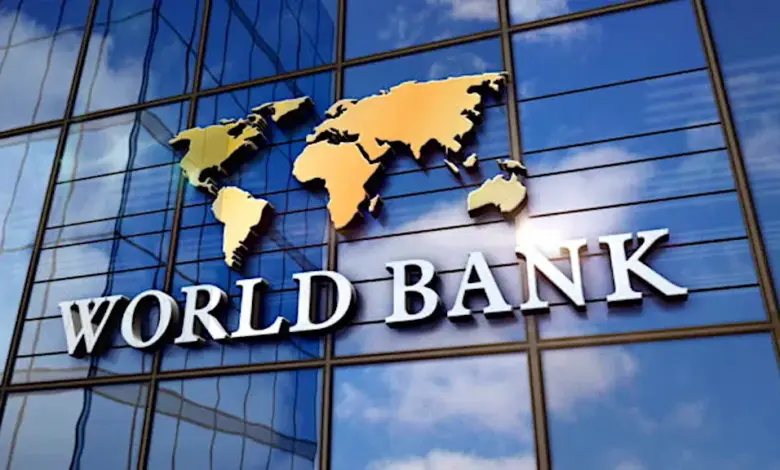World Bank revises Ghana’s end-year growth rate upward to 4.3%


The World Bank now expects Ghana’s economy to end 2025 with a growth rate of 4.3%, up from its earlier projection of 3.9%.
This was contained in the October 2025 edition of the Africa’s Pulse Report released by the Bank in Washington, D.C., USA.
The revised projection is slightly higher than the 4.4% growth target set by the Government of Ghana in the 2025 Budget.
Ghana’s economy expanded by 6.3% in the second quarter of 2025, driven mainly by the services sector, which grew by 9.9% and contributed the largest share to GDP.
According to the World Bank, Ghana’s growth outlook remains positive, with projections of 4.6% in 2026 and 4.8% in 2027.
Sub-Saharan Africa Outlook
The report also noted that Sub-Saharan Africa’s economy remains resilient, with growth projected to reach 3.8% in 2025, up from 3.5% in 2024.
This acceleration, the Bank explained, reflects easing inflationary pressures and a modest recovery in investment despite ongoing global uncertainties.
It further observed that the number of African countries experiencing double-digit inflation has dropped sharply—from 23 in October 2022 to 10 in July 2025—signalling progress in price stabilisation.
However, it warned that downside risks persist, including the indirect effects of global trade policy uncertainty, declining investor appetite, and a shrinking pool of external finance and development assistance.
World Bank on Ghana’s Inflation
The World Bank projects Ghana’s inflation to end 2025 at 15.4%.
This forecast contrasts with the latest official figure of 9.4% for September 2025, down sharply from 21.5% in September 2024.
Analysts say the World Bank’s projection appears conservative, as Ghana has already achieved single-digit inflation in recent months.
Nonetheless, the report indicates optimism for further disinflation, projecting that Ghana’s inflation will drop to 9.4% in 2026.
Meanwhile, the Bank of Ghana, in its latest Monetary Policy Report, maintained that inflation is expected to remain in the single-digit range by the end of 2025.
Cedi’s Performance
The Ghana cedi has appreciated by over 20% year-to-date in the first eight months of 2025, after weakening by 19% in 2024.
The World Bank attributes the cedi’s strong performance to tight fiscal and monetary policies, rising export revenues—especially from cocoa and gold—and improved market confidence following the completion of Ghana’s debt restructuring process.
However, the Bank expressed concern over a 14% depreciation of the cedi between June and early September, attributed to the Bank of Ghana’s limited foreign exchange supply amid rising import demand ahead of the festive season.
The report also confirmed that Ghana has exited the “debt distress” classification, having made significant progress in restructuring obligations to bilateral and commercial creditors.
Still, the Bank warned that refinancing pressures remain a major risk, as Ghana faces a US$500 million Eurobond redemption in 2025 (0.7% of GDP), which rises to 1.2% of GDP in 2026.
These pressures, it added, are not unique to Ghana, with several Sub-Saharan African economies facing peak debt maturities in 2026, potentially heightening regional risk premiums.
Improving Business Environment
The report observed that business conditions in Ghana have improved, with the Purchasing Managers’ Index (PMI) rising from 50.2 in July to 50.8 in August 2025, supported by new orders and sustained job creation.
Although poor weather slightly affected output, business optimism remained strong as new sales and orders increased amid reduced input costs and a stronger cedi.
Inflation also continued to decline, falling for the seventh consecutive month to 12.1% in July 2025, from 23.8% in December 2024.
The report further recalled that Ghana’s “Dumsor” power crisis (2012–2016) caused a 12.3% reduction in foreign direct investments (FDI) in non-energy sectors.
It explained that firms frequently exposed to power outages exhibited lower productivity due to disrupted operations, high self-generation costs, and reduced capital efficiency.
The Bank emphasised that stable power supply and competitive energy pricing are critical to sustaining industrial productivity and attracting new investments.
DISCLAIMER: The Views, Comments, Opinions, Contributions and Statements made by Readers and Contributors on this platform do not necessarily represent the views or policy of Multimedia Group Limited.
DISCLAIMER: The Views, Comments, Opinions, Contributions and Statements made by Readers and Contributors on this platform do not necessarily represent the views or policy of Multimedia Group Limited.
Source link





